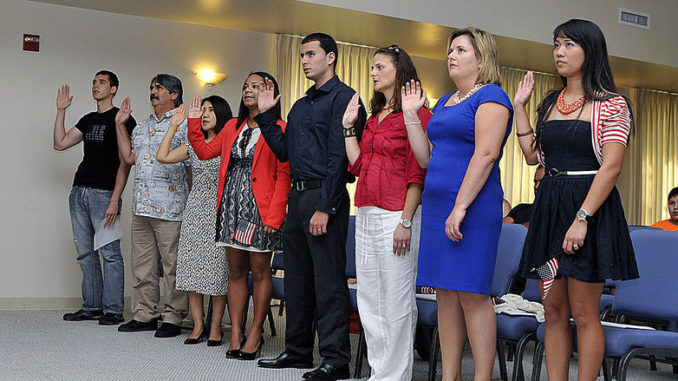
A U.S. legal permanent has filed a lawsuit arguing that including the phrase “so help me God” in the citizenship oath violates the First Amendment right to religious freedom.
On Nov. 2, French national Olga Paule Perrier-Bilbo filed the federal lawsuit. Perrier-Bilbo is currently slated to become a U.S. citizen, MassLive reports.
“Accordingly, the current oath violates the first 10 words of the Bill of Rights, and to participate in a ceremony which violates that key portion of the United States Constitution is not supporting of defending the constitution as the oath demands,” the lawsuit stated.
Since 2000, Perrier-Bilbo has resided in Scituate, Massachusetts. She was granted permanent residence status in 2002 and obtained a green card in 2004. She began seeking citizenship in 2008 and has been approved to take her oath of citizenship.
The 48-year-old Perrier-Bilbo is an atheist. Her lawsuit argues that including “so help me God” in her oath would marginalize her as a citizen.
“By placing a religious statement (to which Plaintiff does not adhere) into the Oath of Naturalization, and then forcing Plaintiff to use an alternative oath (so that she must feel less than a new citizen), Defendants substantially burden Plaintiff in her exercise of religion,” the lawsuit continued.
The U.S. federal government had offered to allow Perrier-Bilbo to have a private ceremony where she could say the oath without the phrase; it also said she could simply choose to not say the phrase during a public ceremony. Her lawsuit argues that this does not address her central complaint with the citizenship oath as written.
“The phrase ‘so help me God,’ added to the nation’s officials Naturalization Oath, sends the ancillary message to members of the audience that disbelieve in God that they are outsiders, not full members of the political community, and an accompanying message to those that believe in God that they are insiders, favored members of the political community,” the lawsuit concluded.
On Oct. 16, a survey conducted by the Pew Research Center found that 46 percent of Americans believed it was not necessary for a person to believe in God to have good moral values, according to Newsweek.
Perrier-Bilbo is represented by Michael Newdow, a California attorney who has attempted to expunge religious references in U.S. institutions before.
In January 2016, Newdow filed a lawsuit arguing that having the motto “In God We Trust” emblazoned on U.S. currency violated the separation of church and state, according to Cleveland.com.
“The ‘In G-d We Trust’ phrase has continued to be a tool used to perpetuate favoritism for (Christian) Monotheism,” Newdow’s lawsuit stated. “It has also continued to perpetuate anti-Atheistic bias.”
In 2000, Newdow also filed an unsuccessful lawsuit to remove the phrase “under God” from the Pledge of Allegiance.
Erwin Chemerinsky, the dean of Berkeley Law, asserted that Perrier-Bilbo’s lawsuit would face significant legal hurdles because courts had also rejected Newdow’s other lawsuits.
“Courts generally have not been receptive to this in the context of the Pledge of Allegiance,” Chemerinsky said.
END

Be the first to comment